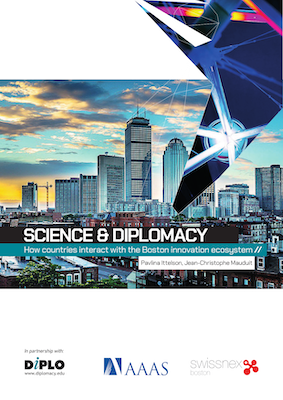Note: This article is a part of the publication ‘Science diplomacy capacity development: Reflections on Diplo’s 2021 course and the road ahead’
Diplo has a track record of more than 20 years of capacity development in diplomacy. Given the increasing relevance of science diplomacy, expanding our program to include aspects of its theory and practice felt like an organic development. We offered our ten-week Science Diplomacy course for the first time in October 2021.
Our Science Diplomacy course builds on a number of conversations in our Diplo WebDebate format (DiploFoundation, 2022a, 2022b) and research conducted in conversation with practitioners at CERN (The European Organization for Nuclear Research), which led to reflections on suitable institutional frameworks and effective capacity development for Science Diplomacy (Höne and Kurbalija, 2018). At its core, our 2021 course is a collaborative effort.
We partnered with two Geneva-based organizations, the Geneva Science and Diplomacy Anticipator (GESDA) and the Geneva Science-Policy Interface (GSPI). GESDA and GSPI provided course materials and co-lectured on the course. Both Diplo and course participants benefited tremendously from this cooperation. Furthermore, this and other initiatives, such as the Science Diplomacy Week (Jefford, 2022), highlight the importance of collaboration on Science Diplomacy within the Geneva ecosystem.
The lecture team was completed by Dr Tim Flink who brought his rich experience as a Science Diplomacy researcher and offered the important ability to separate hype from reality when it comes to the practice of Science Diplomacy. Reaching across the Atlantic, Diplo US partnered with the National Science Policy Network as part of their Science Diplomacy Exchange and Learning (SciDEAL) program. This meant that we worked with five NSPN SciDEAL fellows over the course of 2021 to develop course materials and to have conversations on the nature and utility of Science Diplomacy. The fellows brought their knowledge and skills in the ‘hard’ sciences and science policy to the table and developed them further in conversation with us and with our course participants.
Speaking of collaboration, our course participants also need to be mentioned. Diplo’s learning methodology is collaborative at its core and places joint knowledge construction as its highest value. This course brought together a cohort of 21 participants that came from both science and diplomacy, covering a wide range of scientific specialisations. Bringing diplomats and scientists together in the same course was an important element contributing to joint knowledge construction. Moreover, the diversity of backgrounds meant that participants were experts in some areas while completely new to other areas of Science Diplomacy, which led to further mutual learning experiences. The 100% course completion rate is a testament to their dedication.
In the following, you will find reflections from the course lecturers, the NSPN SciDEAL fellows, and, most importantly, course participants. For us, it was crucial to bring everyone together while the course was still fresh in their minds and ask for reflections on capacity development in Science Diplomacy and future directions of Science Diplomacy.
Course participants in particular reflected on how to integrate the lessons from the course into their work. For some, the course even provided the impetus to re-adjust the future trajectory of their career. In particular, the concept of ‘boundary spanning’, which describes bridging the policy and scientific spheres to facilitate research and increase policy impact (Gustafsson and Lidskog, 2018), proved to be useful for many participants in orienting their future plans.
For Diplo, delivering this course provided a lot of inspiration and motivation to keep engaging in capacity development in Science Diplomacy. The prominence of the topic has been steadily increasing over the last ten years and we find that the various tools and knowledge offered under the umbrella of Science Diplomacy are crucial in addressing some of the most pressing problems of our planet and our time. Nevertheless, we are also mindful of the trap of hype around Science Diplomacy (Kurbalija, 2022), which bears the danger of emptying it of meaning. It is precisely this balancing act that we want to get right with our future science diplomacy capacity development.








